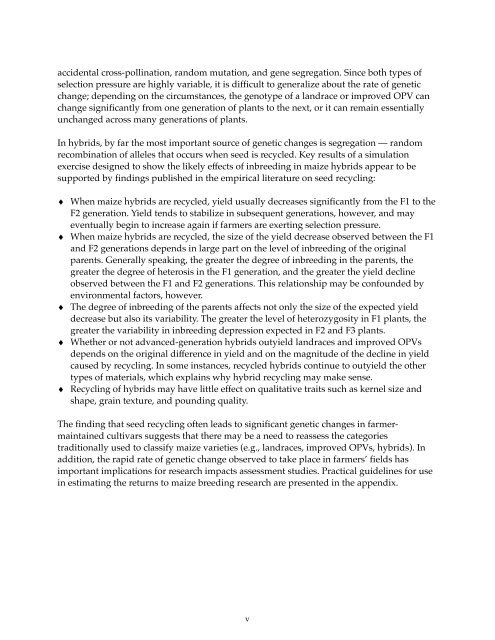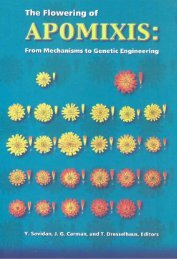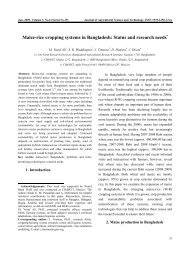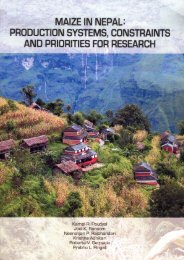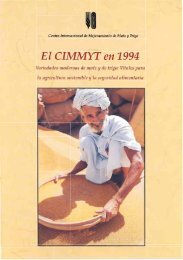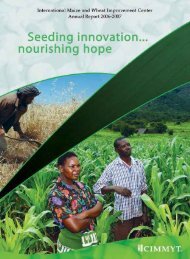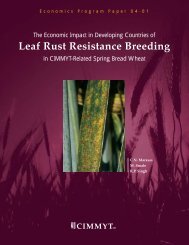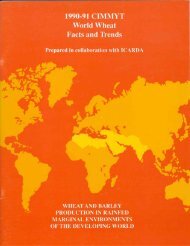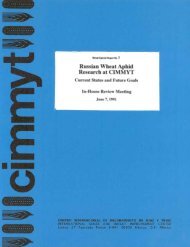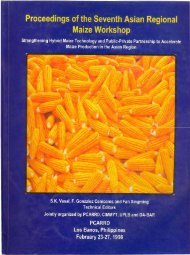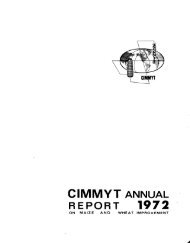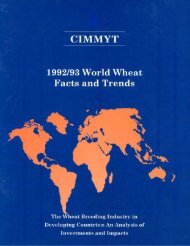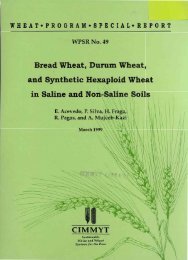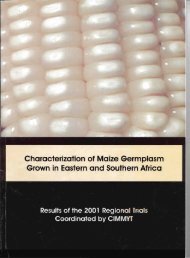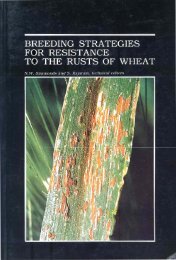A Review of the Evidence - Search CIMMYT repository
A Review of the Evidence - Search CIMMYT repository
A Review of the Evidence - Search CIMMYT repository
Create successful ePaper yourself
Turn your PDF publications into a flip-book with our unique Google optimized e-Paper software.
accidental cross-pollination, random mutation, and gene segregation. Since both types <strong>of</strong>selection pressure are highly variable, it is difficult to generalize about <strong>the</strong> rate <strong>of</strong> geneticchange; depending on <strong>the</strong> circumstances, <strong>the</strong> genotype <strong>of</strong> a landrace or improved OPV canchange significantly from one generation <strong>of</strong> plants to <strong>the</strong> next, or it can remain essentiallyunchanged across many generations <strong>of</strong> plants.In hybrids, by far <strong>the</strong> most important source <strong>of</strong> genetic changes is segregation — randomrecombination <strong>of</strong> alleles that occurs when seed is recycled. Key results <strong>of</strong> a simulationexercise designed to show <strong>the</strong> likely effects <strong>of</strong> inbreeding in maize hybrids appear to besupported by findings published in <strong>the</strong> empirical literature on seed recycling:♦ When maize hybrids are recycled, yield usually decreases significantly from <strong>the</strong> F1 to <strong>the</strong>F2 generation. Yield tends to stabilize in subsequent generations, however, and mayeventually begin to increase again if farmers are exerting selection pressure.♦ When maize hybrids are recycled, <strong>the</strong> size <strong>of</strong> <strong>the</strong> yield decrease observed between <strong>the</strong> F1and F2 generations depends in large part on <strong>the</strong> level <strong>of</strong> inbreeding <strong>of</strong> <strong>the</strong> originalparents. Generally speaking, <strong>the</strong> greater <strong>the</strong> degree <strong>of</strong> inbreeding in <strong>the</strong> parents, <strong>the</strong>greater <strong>the</strong> degree <strong>of</strong> heterosis in <strong>the</strong> F1 generation, and <strong>the</strong> greater <strong>the</strong> yield declineobserved between <strong>the</strong> F1 and F2 generations. This relationship may be confounded byenvironmental factors, however.♦ The degree <strong>of</strong> inbreeding <strong>of</strong> <strong>the</strong> parents affects not only <strong>the</strong> size <strong>of</strong> <strong>the</strong> expected yielddecrease but also its variability. The greater <strong>the</strong> level <strong>of</strong> heterozygosity in F1 plants, <strong>the</strong>greater <strong>the</strong> variability in inbreeding depression expected in F2 and F3 plants.♦ Whe<strong>the</strong>r or not advanced-generation hybrids outyield landraces and improved OPVsdepends on <strong>the</strong> original difference in yield and on <strong>the</strong> magnitude <strong>of</strong> <strong>the</strong> decline in yieldcaused by recycling. In some instances, recycled hybrids continue to outyield <strong>the</strong> o<strong>the</strong>rtypes <strong>of</strong> materials, which explains why hybrid recycling may make sense.♦ Recycling <strong>of</strong> hybrids may have little effect on qualitative traits such as kernel size andshape, grain texture, and pounding quality.The finding that seed recycling <strong>of</strong>ten leads to significant genetic changes in farmermaintainedcultivars suggests that <strong>the</strong>re may be a need to reassess <strong>the</strong> categoriestraditionally used to classify maize varieties (e.g., landraces, improved OPVs, hybrids). Inaddition, <strong>the</strong> rapid rate <strong>of</strong> genetic change observed to take place in farmers’ fields hasimportant implications for research impacts assessment studies. Practical guidelines for usein estimating <strong>the</strong> returns to maize breeding research are presented in <strong>the</strong> appendix.v


